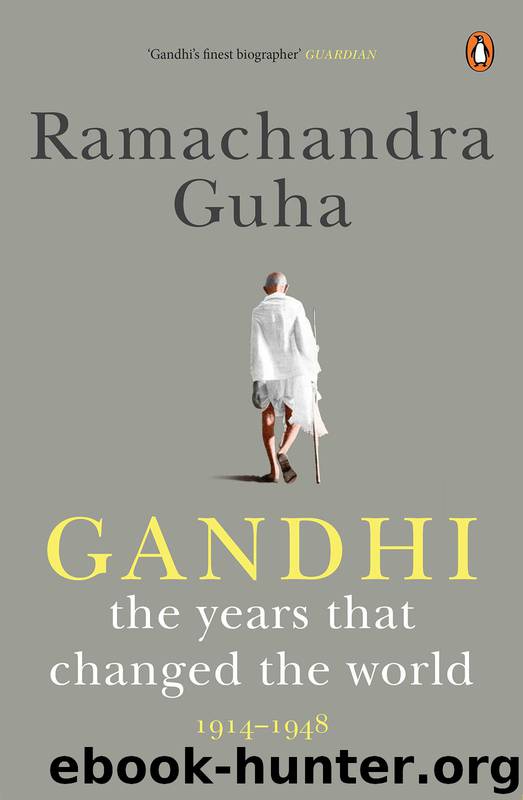Gandhi 1914-1948: The Years That Changed the World by Guha Ramachandra

Author:Guha, Ramachandra [Guha, Ramachandra]
Language: eng
Format: azw3, epub
ISBN: 9780141946344
Publisher: Penguin Books Ltd
Published: 2018-09-26T16:00:00+00:00
IV
Gandhi read The Annihilation of Caste soon after it was published. Meeting a deputation of the Depressed Classes in Bangalore on 10 June, he remarked that ‘when Dr. Ambedkar abuses us, I say it serves us right’. Gandhi claimed that ‘Hinduism is a dying cult if it will not purge itself of untouchability and will perish, Ambedkar or no Ambedkar’.
Later the same day, addressing a conference of Harijan workers, Gandhi praised Ambedkar as ‘intellectually . . . superior to thousands of intelligent and educated caste Hindus’. And yet, the ‘orthodox Brahmin will be defiled by the touch of Dr. Ambedkar and that because of his unpardonable sin that he was born a Mahar’.12
Gandhi is only glancingly mentioned in The Annihilation of Caste. But he saw the text as a challenge to his own understanding of caste and Hinduism. So, after those first, impromptu reactions in Bangalore, he wrote a critique for publication in Harijan. Gandhi began by saying that ‘no Hindu who prizes his faith above life itself can afford to underrate the importance of his indictment’. For, ‘Dr. Ambedkar is not alone in his disgust. He is the most uncompromising exponent and one of the ablest among them. He is certainly the most irreconcilable among them.’
Acknowledging the force of Ambedkar’s criticisms, Gandhi said the upper castes had, in response, got ‘to correct their belief and their conduct’. He himself was clear that ‘nothing can be accepted as the word of God, which cannot be treated by reason . . .’
At the same time, Gandhi believed that Ambedkar had ‘over-proved his case’ by picking upon ‘texts of doubtful authenticity’ and the current ‘degraded’ practice of Hindus. Naming a whole array of reformers down the ages—from Thiruvalluvar and Chaitanya down to Rammohan Roy and Vivekananda—Gandhi asked whether Hinduism was indeed as ‘utterly devoid of merit as is made out in Dr. Ambedkar’s indictment’. Gandhi himself believed that ‘a religion has to be judged not by its worst specimens but by the best it might have produced. For that and that alone can be used as the standard to aspire to, if not to improve upon.’13
Ambedkar replied to Gandhi immediately. He took up Gandhi’s claim that a religion must be judged by its best practitioners. Ambedkar agreed with this statement, but, he noted, ‘the question still remains—why the best number so few and the worst so many?’ His own answer was that ‘the religious ideal [of Hinduism] is a wholly wrong ideal which has given a wrong moral twist to the lives of the many and that the best have become best in spite of the wrong ideal’.
In this rebuttal, Ambedkar, for the first time, adopted a personal, polemical tone in challenging Gandhi. In one place, he wrote that ‘the Mahatma appears not to believe in thinking’. In another, he complained of ‘the double role which the Mahatma wants to play—of a Mahatma and a Politician’. Others had made the same point before, while suggesting that Gandhi stick to religious matters. Ambedkar was less charitable.
Download
Gandhi 1914-1948: The Years That Changed the World by Guha Ramachandra.epub
This site does not store any files on its server. We only index and link to content provided by other sites. Please contact the content providers to delete copyright contents if any and email us, we'll remove relevant links or contents immediately.
Fanny Burney by Claire Harman(26585)
Empire of the Sikhs by Patwant Singh(23063)
Out of India by Michael Foss(16837)
Leonardo da Vinci by Walter Isaacson(13295)
Small Great Things by Jodi Picoult(7105)
The Six Wives Of Henry VIII (WOMEN IN HISTORY) by Fraser Antonia(5490)
The Wind in My Hair by Masih Alinejad(5078)
A Higher Loyalty: Truth, Lies, and Leadership by James Comey(4942)
The Crown by Robert Lacey(4793)
The Lonely City by Olivia Laing(4790)
Millionaire: The Philanderer, Gambler, and Duelist Who Invented Modern Finance by Janet Gleeson(4451)
The Iron Duke by The Iron Duke(4340)
Papillon (English) by Henri Charrière(4241)
Sticky Fingers by Joe Hagan(4178)
Joan of Arc by Mary Gordon(4082)
Alive: The Story of the Andes Survivors by Piers Paul Read(4013)
Stalin by Stephen Kotkin(3946)
Aleister Crowley: The Biography by Tobias Churton(3623)
Ants Among Elephants by Sujatha Gidla(3451)
